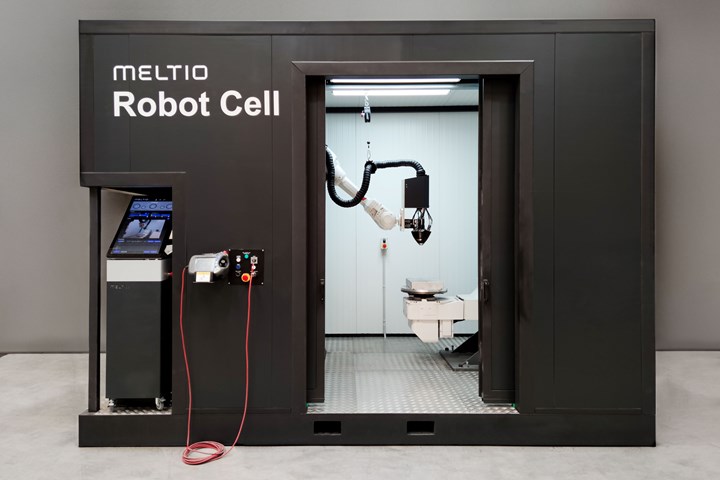Robotic Metal 3D Printer Automates, Augments AM, Repair and Cladding
The ready-to-use Meltio Robot Cell plug-and-play solution integrates Meltio’s metal 3D printing technology with a robotic arm for safe, reliable and automated 3D printing.
Meltio launches the Meltio Robot Cell, a turnkey plug-and-ply robotic arm solution for safer, more reliable and highly accurate metal additive manufacturing (AM) of components autonomously, as well as part repair or a feature addition, attributes that have been seen to produce long-lasting multi-material molds in hybrid AM applications. The entire process is controlled with the company’s Meltio Space slicing software.
The Meltio Robot Cell’s defined volume and work area are said to meet all manufacturing needs. Robot and positioner are installed on a self-supporting platform and a laser-safe enclosure, with Meltio Engine, Meltio Space and accessories. It is designed with a single electrical power supply and a single inert gas supply. Environmental conditions are standard; the cell is only for use in an indoor, controlled space.
Meltio Robot Cell is certified and tested to operate with an ABB robotic arm as standard configuration, though the cell can be delivered with other robotic arm brands to be more responsive to customers in terms of availability and technical capability. Meltio Robot Cell is an evolution of the Meltio Engine Robot Integration as a base production model.
According to Meltio engine product manager, Alejandro Nieto, “Meltio’s main commitment with the launch of Meltio Robot Cell is to offer all types of industries the ability to manage the entire manufacturing process using our metal 3D printing technology consisting of a Meltio head integrated on a robotic arm and in a safe environment, in order to produce parts. This new hardware system allows the customer to receive a ready-to-use cell for robotic metal 3D printing, removing the integration process and long assembly lead times.”
Other technical specifications include a large 3D printing volume with continuous positioner axes interpolation; a 300 × 400-mm actively cooled build platform and build plates; all cell controls are unified on single control panel; and standard CE certification.
Upcoming accessories include the Inert Bubble, a specific hardware option implemented in the welding industry to ensure the best results when printing with high oxidizing materials like titanium and related alloys.
Related Content
-
Machining Center Spindles: What You Need to Know
Why and how to research spindle technology before purchasing a machining center.
-
Maintaining a Wire EDM Machine
To achieve the ultimate capability and level of productivity from your wire EDM on a consistent, repeatable and reliable basis, regular maintenance is a required task.
-
Fundamentals of Designing the Optimal Cooling System
The right mold components can help improve mold cooling and thereby produce higher-quality parts.
_970x90 1.png;maxWidth=970;quality=90)















.png;maxWidth=300;quality=90)
